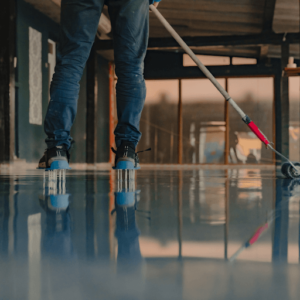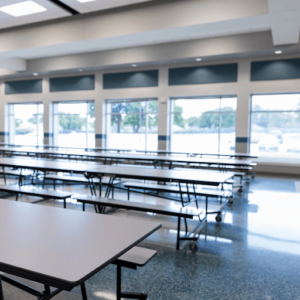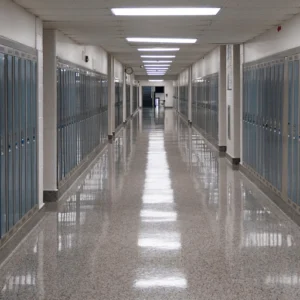
How Epoxy Flooring Meets the Unique Demands of Florida Warehouses
Transform your home with a durable epoxy resin garage floor in just one day. Follow

May 29, 2024

Maintaining a healthy epoxy flooring environment is crucial, and the quality of the air we breathe plays a significant role in this. Often overlooked, flooring materials can impact indoor air quality significantly. Traditional flooring options like some carpets and vinyl can emit Volatile Organic Compounds (VOCs), which may cause health issues over time.
Non-toxic epoxy flooring emerges as an excellent alternative, offering a safer, healthier environment. These flooring solutions are designed to minimize the release of harmful chemicals, ensuring that indoor spaces remain safe and comfortable for everyone, especially in homes, schools, and healthcare facilities.
Continue reading to learn more about how non-toxic epoxy flooring stands out in many aspects.
Epoxy flooring is a type of surface coating that combines resins and hardeners to create a strong, durable bond. When these two components mix, they chemically react to form a rigid plastic material that is tough, resistant to degradation, and bonds exceptionally well to its substrate. Commonly used in commercial and industrial settings, epoxy flooring is favored for its resilience and ability to withstand heavy traffic. This makes it a popular choice for garages, warehouses, and hospitals.
VOCs are chemicals that are emitted as gases from certain solids or liquids, including many types of flooring materials. VOCs include a variety of chemicals, some of which may have short- and long-term adverse health effects. They are found in paints, varnishes, and building materials. These compounds can decrease indoor air quality and pose health risks to occupants.
The health implications of VOC exposure can be significant. Short-term exposure to VOCs can lead to symptoms such as:
Long-term exposure can be more severe, potentially leading to:
This makes the choice of flooring materials important in spaces where people spend a lot of time.
Environmental considerations play a crucial role in creating safer, more sustainable spaces. Epoxy floors stand out for health and ecological benefits.
One of the most significant attributes of modern epoxy flooring is its low Volatile Organic Compound content. VOCs are chemicals that vaporize at room temperature and can release harmful gases into the air. By choosing epoxy floors with low VOCs, homeowners and businesses reduce the risk of air pollution indoors. Epoxy floors make spaces safer for everyone, especially children, the elderly, and those with respiratory issues. Also, they contribute to a healthier environment by reducing the release of these pollutants into the atmosphere.
Another advantage of using advanced epoxy flooring is its odorless formulation. Traditional flooring options can emit strong odors during and after installation. This can be uncomfortable or even harmful over time. Odorless epoxy floors eliminate offer a more pleasant and immediate use of spaces post-installation. This feature is beneficial in basements, hospitals, and schools, where air circulation might be limited, and odor can linger.
Non-toxic epoxy floors align well with green building standards. These standards, set by organizations like the United States Green Building Council through LEED certification, encourage environmentally responsible and resource-efficient building practices. Non-toxic epoxy flooring contributes to meeting these standards by improving indoor environmental quality and using materials that are safer for the environment.
Non-toxic epoxy flooring is gaining popularity due to its impressive range of benefits. Here, we explore how non-toxic epoxy flooring improves indoor air quality, safety, and durability.
Non-toxic epoxy flooring contributes to cleaner indoor air. Traditional flooring solutions can emit VOCs, which are chemicals that can have short and long-term adverse health effects. Non-toxic epoxy, however, is formulated to have low or no VOC emissions. This means it doesn’t release harmful chemicals into the air. Thus, helping to maintain the quality of indoor air and ensure a safer breathing environment. This feature is beneficial in enclosed spaces where air circulation may be limited.
The versatility of non-toxic epoxy flooring extends to its suitability for homes, schools, hospitals, and businesses. In residential settings, safety is paramount, especially in homes with young children or the elderly who may be more susceptible to pollutants. Schools and hospitals, where safety and hygiene are top priorities, also benefit from non-toxic epoxy floors because they are easy to clean and maintain.
The absence of toxic chemicals makes these floors an ideal choice for environments where health and safety standards are stringent. Businesses too find non-toxic epoxy appealing due to its aesthetic appeal and its ability to maintain a safe workplace, free from airborne contaminants that could affect employee health.
Non-toxic epoxy flooring is resilient against wear, tear, and chemical spills, maintaining its appearance and functionality over long periods. Traditional flooring materials like vinyl or carpet can degrade quicker and require frequent replacements or repairs. They may harbor allergens and dust, which are less prevalent in non-toxic epoxy floors due to their seamless and non-porous surface.
Maintenance needs for non-toxic epoxy are minimal. These floors are easy to clean—usually just needing a wipe down with mild soap and water. Other flooring types might need special cleaning agents or intensive labor to maintain their condition. The combination of minimal maintenance, durability, and absence of health risks makes non-toxic epoxy flooring a cost-effective and safe choice for both residential and commercial properties.
Suggested Reading: Epoxy Resin Flooring: Modern Design Guide & Trends
Non-toxic epoxy floors offer a safer and healthier option for both residential and commercial spaces. Here’s a closer look at how these environmentally friendly floors are made:
The production process of non-toxic epoxy flooring is controlled to ensure safety and quality. The primary distinction between non-toxic and standard epoxy is the formulation of the raw materials: resin and hardener components. In standard epoxy, the toxicity of components can include solvents and reactive diluents responsible for the release of VOCs during the curing process. Non-toxic epoxy, on the other hand, uses advanced formulations that reduce or eliminate these volatile compounds.
Key Ingredients in Non-Toxic Epoxy That Reduce or Eliminate VOC Content
Non-toxic epoxy floors support healthier indoor environments. They also offer robust and long-lasting flooring solutions. Their manufacturing process reflects a commitment to sustainability and health. This makes them an ideal choice for anyone looking to combine style with safety in their flooring options.
Let’s explore how non-toxic epoxy compares to other common flooring options in VOC levels and practical benefits:
When compared to other flooring options, non-toxic epoxy provides a compelling mixture of low VOC emissions, ease of maintenance, cost-effectiveness, and aesthetic versatility, making it an excellent choice for both residential and commercial settings.
Suggested Reading: Can Heat and Humidity Affect Epoxy Floors?
Choosing the right flooring is essential not just for the look of your space, but for your health and the planet, too. Non-toxic epoxy flooring is a smart choice for anyone concerned about indoor air quality and environmental sustainability. These floors contain low levels of VOCs, which means they don’t release harmful chemicals into the air. This makes them a safer option for homes, kitchens, schools, grocery stores, and workplaces, helping everyone breathe easier.
If you’re thinking about updating your floors, consider non-toxic epoxy solutions from Apex Flooring as your first step towards a healthier, more sustainable environment. For more detailed information on how our flooring solutions can benefit you, or to explore our products, contact Apex Flooring.
Yes, zero VOC epoxy products are available. These products are specifically formulated to eliminate volatile organic compounds (VOCs), making them a safer choice for indoor environments. Manufacturers achieve this by using alternative ingredients that do not emit harmful gases.
Standard epoxy can give off VOCs, especially during the curing process. The level of VOCs can vary depending on the type of epoxy and its formulation. However, there are also low-VOC and zero-VOC epoxies designed to minimize or eliminate these emissions.
Epoxy flooring is generally safe for indoor use, particularly if it is low-VOC or VOC-free. It is durable, resistant to wear, and easy to clean, making it ideal for both residential and commercial spaces. When selecting epoxy flooring, choosing a product with low or no VOCs is crucial for ensuring it does not adversely affect indoor air quality.
In cases where standard epoxy is used, VOCs can be present for a few days up to several weeks after application. Opting for low-VOC or zero-VOC epoxy products reduces this emission period, often eliminating it entirely.
While epoxy flooring is safe when fully cured, exposure to VOCs during and shortly after application can pose health risks. Symptoms can include eye, nose, and throat irritation, allergic skin reactions, and respiratory distress. These risks are significantly lower or non-existent with low-VOC and VOC-free epoxies.
Written By:
Hannah Clark, leveraging her Civil Engineering background from the University of Florida, has specialized in material sciences and sustainability, focusing particularly on epoxy flooring. Over her 15-year career, Hannah has provided insightful content that explains the technical benefits and innovative applications of epoxy in both residential and commercial settings.

Transform your home with a durable epoxy resin garage floor in just one day. Follow

Transform your home with a durable epoxy resin garage floor in just one day. Follow

Transform your home with a durable epoxy resin garage floor in just one day. Follow
Get In Touch
Get a Free Epoxy Flooring Estimate

Providing epoxy flooring services for homes & businesses across Florida, Atlanta GA, and Charleston SC.
Quick Links
Copyright © 2025 Apex Flooring, LLC, All Rights Reserved.

For just $2,700, give your 3-car garage a professional epoxy flooring finish backed by our lifetime warranty. Fill out this form below to take advantage of this limited time offer!
For just $2,300, give your 2-car garage a professional epoxy flooring finish backed by our lifetime warranty. Fill out this form below to take advantage of this limited time offer!
For just $2,700, give your 3-car garage a professional epoxy flooring finish backed by our lifetime warranty. Fill out this form below to take advantage of this limited time offer!
For just $2,300, give your 2-car garage a professional epoxy flooring finish backed by our lifetime warranty. Fill out this form below to take advantage of this limited time offer!
Ready to upgrade your garage with Apex Epoxy Flooring? Fill out the form below, and let us handle the rest. Whether it’s a 2-car or 3-car garage, we’re here to deliver top-notch service.